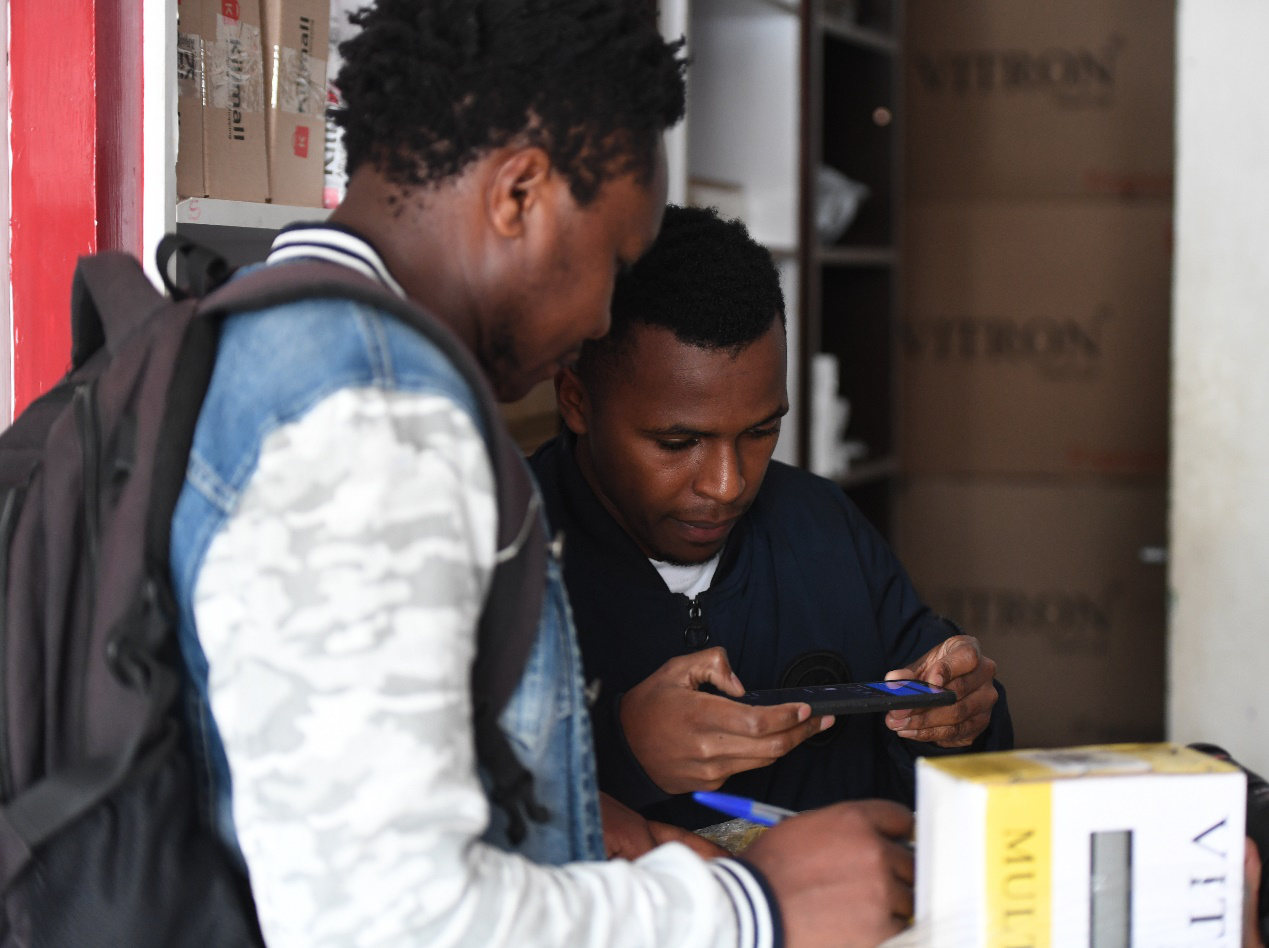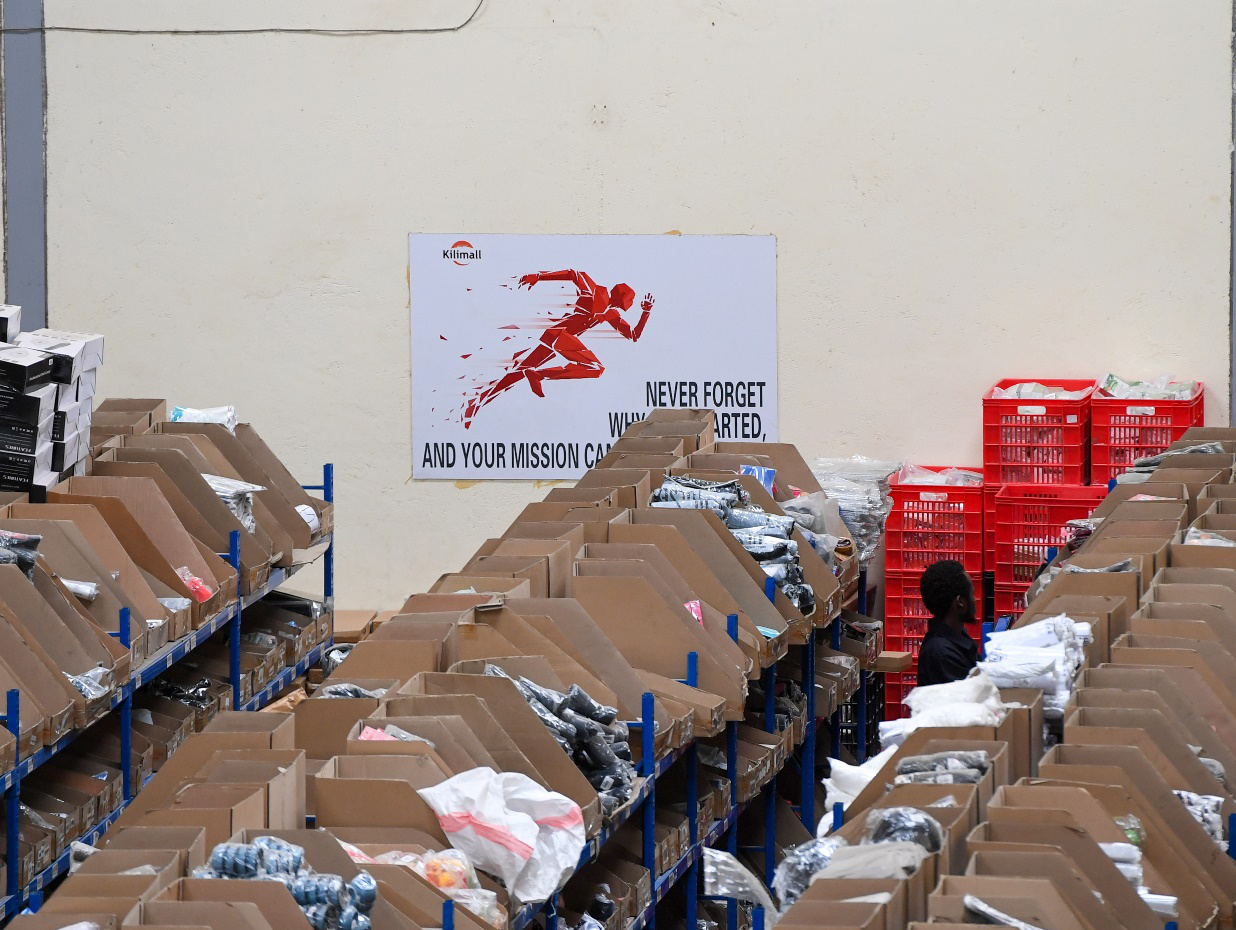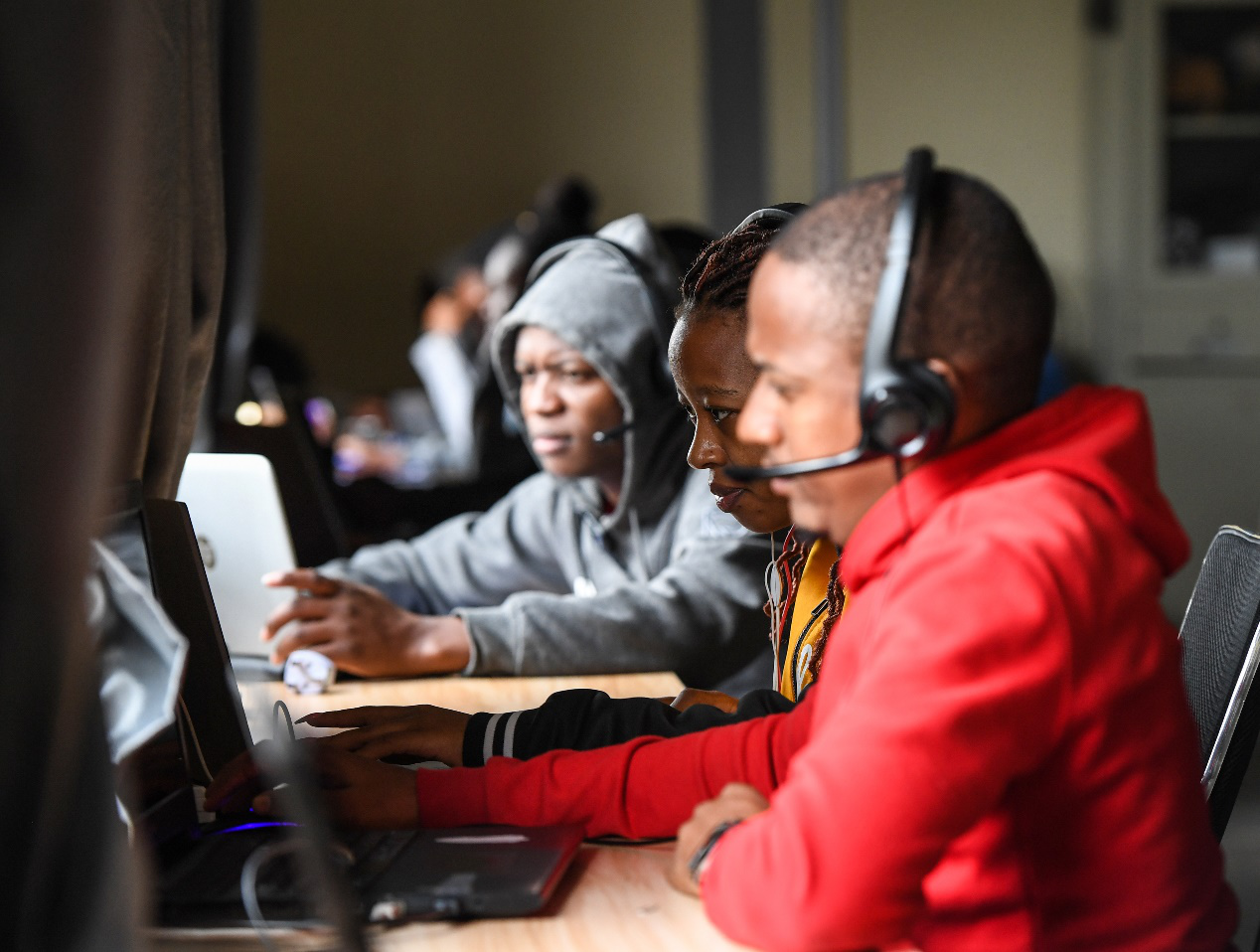Rachael, a 24-year-old Kenyan student, likes to shop online. She often buys clothes and bags online. In the past, she would shop around and browse major e-commerce platforms. However, in the past two years, she almost only bought on e-commerce platform Kilimall. "Kilimall offers a wide range of styles and colors, and the products are also inexpensive. I can always get things I like here. Compared with other platforms, Kilimall's shipping is the cheapest and fastest. Many items can be delivered within 24 hours. This sort of shopping experience is unprecedented in Kenya and it means a lot to me," she said.
Rachel lives and works most of the time in Nairobi, the capital of Kenya. However, she said she found it amazing that Kilimall is able to make same-day deliveries even in her hometown of Kisumu. The online shopping experience that she once only heard about from her Chinese friends has become a reality for her.

On July 28, 2023, an employee at a Kilimall package pickup station (R) helps a customer sign for a pickup in Nairobi, capital of Kenya. (Xinhua)
Susan Wangui, a resident of Nairobi, has been shopping on Kilimall for about five years since 2018. "I've never been disappointed with their products, I've always loved their discounts, and this is my third purchase of the month," she said. "I buy electronics, clothes and jewelry. It saves me time as I don't need to go to town to buy what I need and it's convenient that everything is delivered to my doorstep. It's also fairly priced compared with other platforms, so I prefer Kilimall."
Just like Rachel and Wangui, many people in East Africa believe that Kilimall offers quality goods, a plenitude of choices, affordable prices and efficient services. Founded in 2014 and headquartered in Nairobi, Kilimall is a localized e-commerce platform in Africa that features two-way trade between China and Africa.

On July 28, 2023, a staffer of Kilimall works in a warehouse in Mlolongo, Kenya. (Xinhua)
According to Yang Tao, founder of Kilimall, he was sent to Kenya in 2012 while he was still working at Huawei to help a local telecom operator build a mobile payment system. During that time, he gained a whole new understanding of Africa.
"My previous impressions of Kenya were deserts, animals, poverty, hunger and war, but after I came here, I found that there are very modern cities, the middle class is thriving in Kenya, and they want an increasingly higher quality of life," Yang recalled.
Thanks to his participation in the construction of Kenya's first mobile payment system, Yang has a more direct and concrete understanding of the basic situation of e-commerce in the country. He found a paradox: The incomes of African people are not high, but their consumption costs are quite high, the prices at shopping malls are three to 10 times those of China, and there are very limited choices. In addition, many Chinese businesses found it hard to do business in Africa mainly because of the high costs in many aspects, making their operations often unsustainable.
Seeing the market demand, Yang founded Kilimall with a group of like-minded partners. The name comes from Kilimanjaro, Africa's highest peak, representing their ambition to build Africa's largest e-commerce company.
After getting through the difficult period in the first half a year, Kilimall began its rapid development and won a number of "firsts": the first Chinese e-commerce company to set up an overseas warehouse in Africa, the first e-commerce platform to achieve same-day/next-day delivery in Africa, and the first Chinese company in Africa to achieve 100% online payment.

This photo taken on July 28, 2023, shows a Kilimall warehouse in Mlolongo, Kenya. (Xinhua)
Kevin Wambua has been working at Kilimall for four years. He serves as a senior warehouse director in Kenya, and is responsible for ensuring the safety and accuracy of the entire delivery process. "In Kenya, we have about 5 million consumers all over the country. Our busiest areas include Kisumu, Mombasa and Nairobi. We need to deliver items in a very short time to guarantee customer experience," he said.

On July 28, 2023, employees of Kilimall work in an office in Mlolongo, Kenya. (Xinhua)
In addition to Kilimall's strict and efficient logistics management, the realization of same-day delivery relies more on its self-operated logistics system. Wu Mixiang, a partner of Yang Tao and vice president of Kilimall, has been stationed in Africa for many years. For him, although China's e-commerce development is leading the world, Africa cannot simply copy China's path or apply China's experience.
For example, the development of the logistics industry in Africa is still relatively backward. On the one hand, as the logistics and distribution infrastructure in Africa is not fully developed, many links that can be operated intelligently in China still need manual operation in Africa, the efficiency is very low, and even the successful delivery rate is also low; on the other hand, there are very few local third-party logistics service providers in Africa.
Based on this, if Kilimall wants to improve the quality of its services, it must build its own logistics. Such investment cannot be completed in a day, and it is difficult to bring direct growth to the company in the short term. Fortunately, Kilimall has persevered on this "road that few people take", and now the company has achieved a service inventory accuracy rate of 99.99%, a 48-hour warehousing rate of 99.95%, and a 24-hour out-of-warehouse rate of 99.95%. Its next-day delivery rate is 82%, and the successful delivery rate is more than 98%. It has also set up over 1,500 parcel self-pickup points across Kenya, with a service satisfaction rate of 98.7%.
After consumer experience was optimized, Kilimall earned the trust of a wide range of consumers, and it was the first in Africa to achieve 100% online upfront payment. At that time, 70% to 80% of African e-commerce companies adopted cash on delivery, and the low final fulfillment rate of cash on delivery has long been plaguing them. "Payment before shipping is a huge trust in Africa. All I can say is that we have indeed been slowly shaping this over almost 10 years, and there is no shortcut," Yang said.
Firmly believing in "long-termism," the Kilimall team has successfully passed the startup period with solid investment, and the indigenous gene has given Kilimall the strength to expand to other African countries after cultivating the Kenyan market. Now, it also operates in Uganda and Nigeria. The pace of expansion is not fast compared with its peers, but Kilimall has not encountered major difficulties in adapting to the local market as it moves forward step by step and remains down-to-earth.

On July 28, employees of Kilimall work online in an office in Mlolongo, Kenya. (Xinhua)
Kilimall has served more than 8,000 enterprises so far, with more than 12,000 online stores providing over a million varieties of products. It has more than 300 employees and has created 5,000 jobs. All these figures have witnessed the changes in the lives of many Africans and the growth of small and medium-sized enterprises.
Last year, a young Kenyan opened a store on Kilimall selling made-in-China televisions and its turnover reached over 600,000 U.S. dollars. "There are more and more such entrepreneurs this year, and we have become a startup platform designated by the United Nations and the Kenyan government," Yang said.
In Yang's mind, entrepreneurs and entrepreneurship will be a positive force for change in Africa, "so we have defined a vision for 2044 to empower 1 million entrepreneurs and serve 1 billion African consumers by 2044 at the latest." (By Li Zhuoqun, Zhang Wenyu)




 A single purchase
A single purchase









